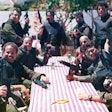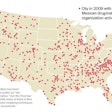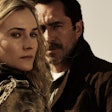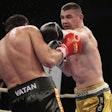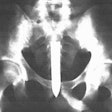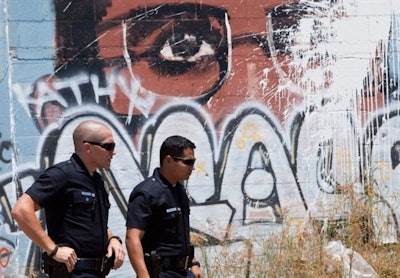 Photo courtesy of Open Road Films.
Photo courtesy of Open Road Films.
It its heyday, Hollywood gave us fanciful but popular depictions of heroes like Errol Flynn in "The Adventures of Robin Hood" (1938), Gary Cooper in "High Noon" (1952), James Stewart in "It's a Wonderful Life" (1946), Gene Kelly in "The Three Musketeers" (1948), and even politicians such as James Stewart in "Mr. Smith Goes to Washington" (1939).
In the small screen of early television, heroes like Hopalong Cassidy and the Cisco Kid defended the weak and brought justice to the wild West. Christian ministers and Catholic priests, such as Bing Crosby in "Going My Way" (1944), were presented as characters to be respected and admired. These stories may have been works of fiction but they inspired us to be better people. These Hollywood heroes accepted fair play and honesty as virtues.
I've had the good fortune to have had some great jobs. I've been a soldier and fire-team leader in Vietnam. I've worked as a deputy in the Los Angeles metropolis, as a gang investigator in the most active station areas, and as the supervisor of a team of detectives assigned to major crimes.
As a result of these experiences, I've collaborated with professional writers and advised Hollywood producers and directors on the real world aspects of law enforcement. In the "pitch room" or on the set of movies and television productions, I've attempted to give these people the best and most realistic information possible. But I've often been frustrated by misconceptions and prejudices in Hollywood. During the production of the television mini-series "Drug Wars – The Camarena Story" (1990) and movie "A Man Apart" (2003), my suggestions often fell on deaf ears. Hollywood prefers its own version of gritty realism.
Hollywood people always say they want gritty realism in the production. To them, gritty realism means the good guys in law enforcement are imperfect. They break into the bad guy's homes to obtain information. They have stashes of illegal weapons. They get drunk or high on drugs. They sleep with their informants and even suspects. They kill people out of revenge. Today's police heroes are really anti-heroes.
When suggest that the best cops are not like that and don't act that way—that sometimes the good guys actually win against bad guys—they laugh at me. They think that honest good guys only win in the fantasy of old-fashioned fairy tales.
Hollywood continues to crank out stereotypical police dramas featuring the seedy underbelly of society and the cockroaches that inhabit it so they can include the required anti-hero cops in the search for gritty realism. Today, anyone who espouses Judeo-Christian values in a movie is usually depicted as a bad guy. There are no characters worth emulating in any of these movies.
One of my favorite writers and one of the most successful, Charles "Chic" Eglee, once told me that the he wrote the good-guy characters as about 80% good and 20% bad, and his bad guys are 80% bad and 20% good. Eglee's negative perceptions of his cop heroes come from his college years and his involvement in the civil rights movement on the East Coast. His perceptions were based on facts that he experienced.
Whether we wish to admit it or not, our role models sometimes come from the characters fleshed out in these fictional Hollywood movies. In the past, these characters were over the top and too good to be true. They have been rejected by movie writers and the public. But which cop would you rather have respond if you or someone in your immediate family had become a crime victim—the cop whose role model was Gary Cooper in "High Noon" or one who's hero is Denzel Washington's Alonzo Harris in "Training Day" (2001)? On a dark and lonely night, do you want the cop who stops your teenage daughter to be only 80% good and 20% bad?
My soul has been hurt and my heart saddened by the increasing wave of police corruption cases that have flashed across the TV and computer screen lately. Even the "holier than thou" FBI has reported an unprecedented number of federal agents who have been convicted of corruption, even in very high positions. We've been disappointed and shocked by the unethical conduct of some of our peers and supervisors. What's changed?
Some of the blame for this unprecedented corruption can be laid at the feet of cops in current Hollywood movies and television. Instead of holding up a moral and ethical crusader and knight-like hero, they consistently give us the gritty realism of the anti-hero cop. The police characters they have given us are flawed. They play hard and fast with the rules. They win by any means necessary.
The newer generation who have grown up with these stereotypical, and popular, depictions of cops as anti-heroes have become victims of this propaganda. The acceptance of this stereotype seriously weakens the mind-set of young people and endangers their ability to resist ethical and moral corruption and misconduct. Rather than calling them up to the higher principals, these movies seemingly condone cheating and acts of street justice under the color of authority.
"End of Watch" (2012), which has made several top-10 lists, provides a refreshing avoidance of this Hollywood formula. This production has captured the most realistic depiction of everyday police officers working a gang-infested, economically-depressed, crime-ridden area. The two primary actors, who play LAPD partners, accurately portray the dialogue and banter exchanged in a patrol car by real cops while attempting to keep the peace in this impossible environment. It seemed so real that I felt like I had known these cops at some point in my career. It transported me to my time as a Los Angeles County Sheriff's deputy.
As with the best cohesive units I was part of, the kidding and bantering was sometimes racial. But contrary to the usual Hollywood stereotype, the cop characters were not depicted as racist or bigots. They liked each other. In attempting to do their jobs, the cops risked life and limb to protect the innocent, especially the children, who exist in the accurately portrayed gritty reality of the ghetto. The characters showed us that these cops honestly cared for people.
The movie's gang-member characters are also more like real gang members. Unlike most stereotypical Hollywood gang characters, they are accurately portrayed as violently crazy and dangerous, but disciplined while operating within their own code of conduct. They are much more frightening as villains because of this. The introduction of Mexican drug cartels into the story is an additional true-to-life departure from Hollywood's political correctness.
This movie isn't perfect, but it's a positive depiction of the men and women of law enforcement. It is not a fairy tale, but it's uplifting and inspirational. Like those classic movies, this movie shows the noble side of this job and the sacrifice required to be a good officer.
Because of my experience with Hollywood movies, I hung around after the last scene to see the credits. Near the end, I saw part of the reason why this film was so accurate and realistic. The list of technical advisors included experienced gang cops from LAPD CRASH and LASD OSS gang units. The movie is now available on DVD and Blu-Ray.
Related:
Is 'End of Watch' Just 'Training Day II?'












